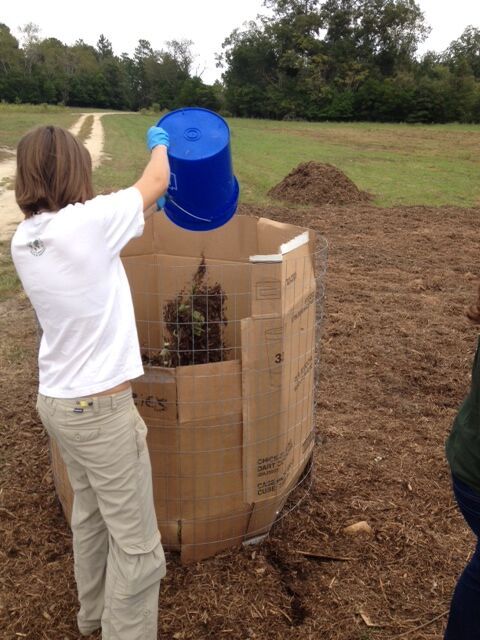Center for Sustainability Begins On-Campus Composting
October 6, 2015
The Center for Sustainability is partnering with Dining Services and Facilities Services in piloting an on campus composting program. Students can volunteer to help compost food waste from dining commons creating soil that can be used in a variety of ways on campus, including growing food that will go back to the dining commons, creating a renewable cycle.
Discussing the goals of the program, Dr. Lissa Leege, the Center for Sustainability Director, wants to reduce and eventually eliminate the amount of food waste that gets sent to landfills, using them for other things, including supplying food to the dining commons and soil to campus development projects.
“We’re taking the food waste and instead of sending it to the landfill we’re turning it back into soil that’s going to be used on our campus…” says Leege. “It’s this great closed loop where we’re creating waste materials in the dining halls but then taking these materials and turning them back into something that’s productive and will support our campus.”
The program, which was developed this summer by Scott Blair, Center for Sustainability Graduate Assistant, works by collecting food waste from the dining commons and transporting it to a site maintained by Facilities Services. Student volunteers come to the site at the end of the week, using buckets to combine the food scraps with woodchips present at the site. The mixture is placed into wire bins, where carbon in the woodchips reacts with nitrogen in the organic matter, which decomposes into a nutrient rich soil over the course of 3-4 months.
Blair researched a number of composting methods, including taking a visit to the University of Georgia, which hosts its own composting program, and hopes to achieve a greater degree of campus sustainability.
“The idea would be to continuously collect food waste,” says Blair. “That way none of it ends up in the waste stream and all of it gets composted and recycled as a valuable material.”
The composting program will work in conjunction with another volunteer sustainability project, the Campus Garden, providing soil used to grow plants that will be used by Dining Commons and Catering Services. According to Blair, the Garden has already seen use this summer, supplying Catering Services with 20 lbs. of squash for use at a university hosted event.
Blair is also confident that the program will spark a wider interest and awareness in sustainability among Georgia Southern students.
“It’s a real tangible way for students to see a difference in sustainability,” says Blair. “In the end they’ll be able to see a product that they helped to create.”
Allison Burt, a Sophomore Biology major, has participated in two composting sessions now, and believes in the importance of the program.
“Our food is from Landrum so its local, and then we use local woodchips as well,” says Burt. “We can actually put use to things people think of as waste, and make it beneficial.”
Because of the small scale, volunteer based nature of the program, the Center for Sustainability can only accept enough food waste to fill 12 wire bins. However, Dr. Leege is stresses this is only the beginning.
“Ultimately we want this to be much larger, and not have this be a manual process, but actually use large machines to process our food waste and campus waste,” says Leege. “We’re on the road to providing the foods that we grow to our dining facilities here.”
Students can volunteer by going to the Center for Sustainability website, where they can sign up online for upcoming events.








